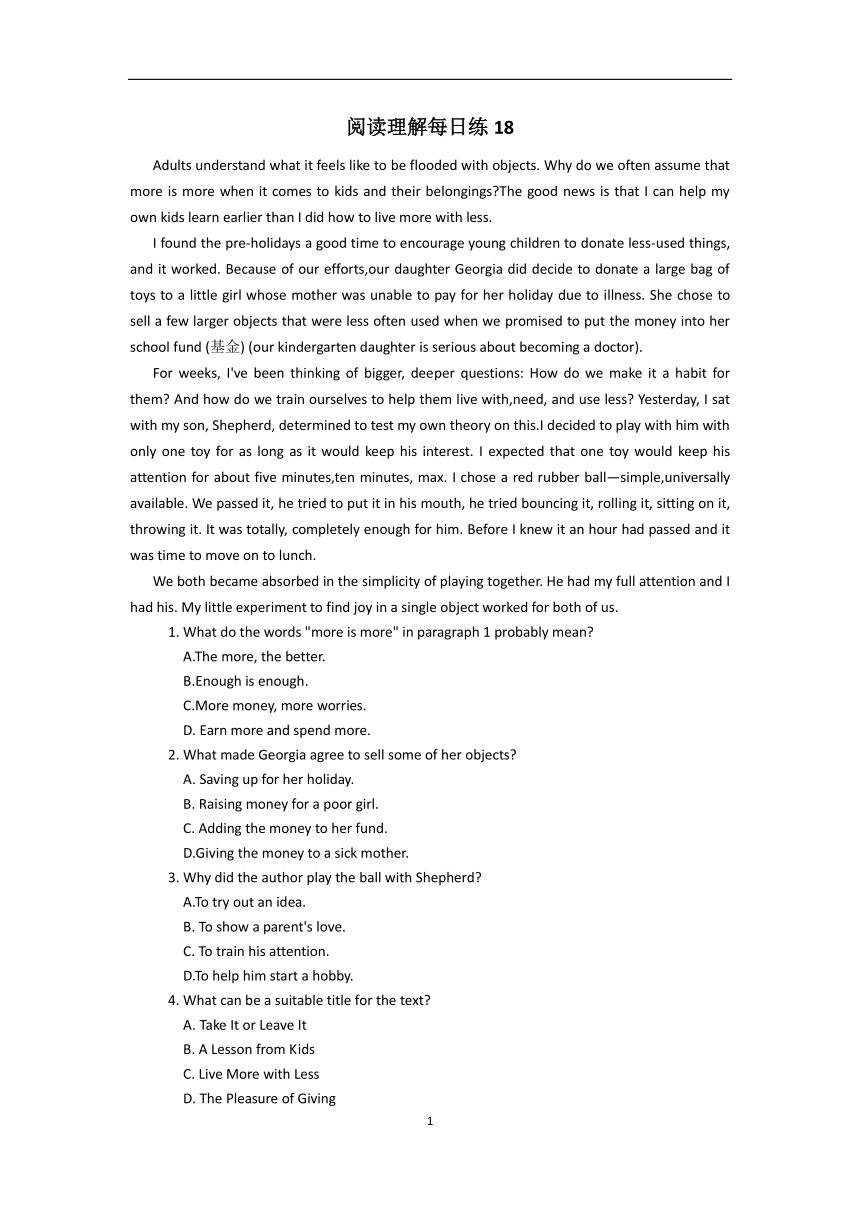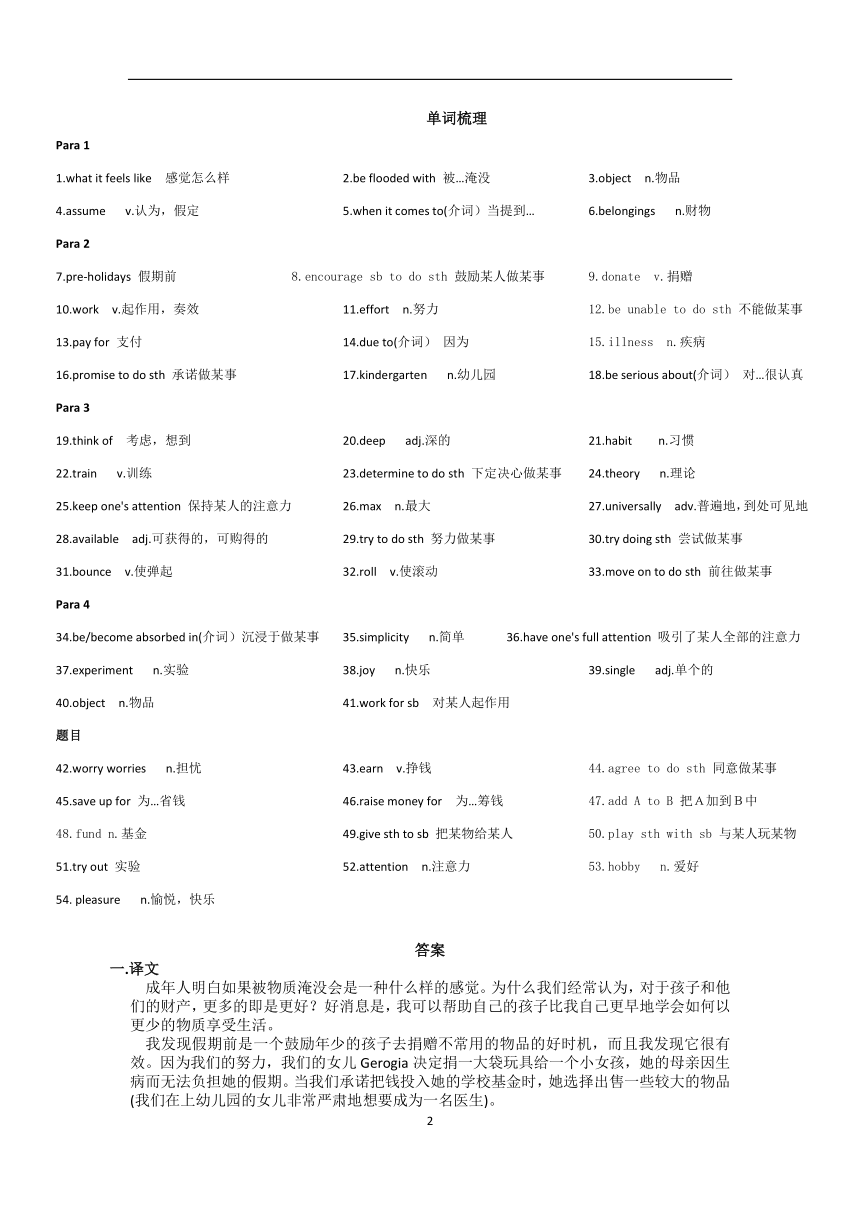2024届高三英语二轮复习阅读 练习 学案(含答案)
文档属性
| 名称 | 2024届高三英语二轮复习阅读 练习 学案(含答案) |  | |
| 格式 | docx | ||
| 文件大小 | 27.2KB | ||
| 资源类型 | 教案 | ||
| 版本资源 | 通用版 | ||
| 科目 | 英语 | ||
| 更新时间 | 2024-03-06 12:31:43 | ||
图片预览


文档简介
阅读理解每日练18
Adults understand what it feels like to be flooded with objects. Why do we often assume that more is more when it comes to kids and their belongings The good news is that I can help my own kids learn earlier than I did how to live more with less.
I found the pre-holidays a good time to encourage young children to donate less-used things, and it worked. Because of our efforts,our daughter Georgia did decide to donate a large bag of toys to a little girl whose mother was unable to pay for her holiday due to illness. She chose to sell a few larger objects that were less often used when we promised to put the money into her school fund (基金) (our kindergarten daughter is serious about becoming a doctor).
For weeks, I've been thinking of bigger, deeper questions: How do we make it a habit for them And how do we train ourselves to help them live with,need, and use less Yesterday, I sat with my son, Shepherd, determined to test my own theory on this.I decided to play with him with only one toy for as long as it would keep his interest. I expected that one toy would keep his attention for about five minutes,ten minutes, max. I chose a red rubber ball—simple,universally available. We passed it, he tried to put it in his mouth, he tried bouncing it, rolling it, sitting on it, throwing it. It was totally, completely enough for him. Before I knew it an hour had passed and it was time to move on to lunch.
We both became absorbed in the simplicity of playing together. He had my full attention and I had his. My little experiment to find joy in a single object worked for both of us.
1. What do the words "more is more" in paragraph 1 probably mean
A.The more, the better.
B.Enough is enough.
C.More money, more worries.
D. Earn more and spend more.
2. What made Georgia agree to sell some of her objects
A. Saving up for her holiday.
B. Raising money for a poor girl.
C. Adding the money to her fund.
D.Giving the money to a sick mother.
3. Why did the author play the ball with Shepherd
A.To try out an idea.
B. To show a parent's love.
C. To train his attention.
D.To help him start a hobby.
4. What can be a suitable title for the text
A. Take It or Leave It
B. A Lesson from Kids
C. Live More with Less
D. The Pleasure of Giving
单词梳理
Para 1
1.what it feels like 感觉怎么样 2.be flooded with 被…淹没 3.object n.物品
4.assume v.认为,假定 5.when it comes to(介词)当提到… 6.belongings n.财物
Para 2
7.pre-holidays 假期前 8.encourage sb to do sth 鼓励某人做某事 9.donate v.捐赠
10.work v.起作用,奏效 11.effort n.努力 12.be unable to do sth 不能做某事
13.pay for 支付 14.due to(介词) 因为 15.illness n.疾病
16.promise to do sth 承诺做某事 17.kindergarten n.幼儿园 18.be serious about(介词) 对…很认真
Para 3
19.think of 考虑,想到 20.deep adj.深的 21.habit n.习惯
22.train v.训练 23.determine to do sth 下定决心做某事 24.theory n.理论
25.keep one's attention 保持某人的注意力 26.max n.最大 27.universally adv.普遍地,到处可见地
28.available adj.可获得的,可购得的 29.try to do sth 努力做某事 30.try doing sth 尝试做某事
31.bounce v.使弹起 32.roll v.使滚动 33.move on to do sth 前往做某事
Para 4
34.be/become absorbed in(介词)沉浸于做某事 35.simplicity n.简单 36.have one's full attention 吸引了某人全部的注意力
37.experiment n.实验 38.joy n.快乐 39.single adj.单个的
40.object n.物品 41.work for sb 对某人起作用
题目
42.worry worries n.担忧 43.earn v.挣钱 44.agree to do sth 同意做某事
45.save up for 为…省钱 46.raise money for 为…筹钱 47.add A to B 把A加到B中
48.fund n.基金 49.give sth to sb 把某物给某人 50.play sth with sb 与某人玩某物
51.try out 实验 52.attention n.注意力 53.hobby n.爱好
54. pleasure n.愉悦,快乐
答案
一.译文
成年人明白如果被物质淹没会是一种什么样的感觉。为什么我们经常认为,对于孩子和他们的财产,更多的即是更好?好消息是,我可以帮助自己的孩子比我自己更早地学会如何以更少的物质享受生活。
我发现假期前是一个鼓励年少的孩子去捐赠不常用的物品的好时机,而且我发现它很有效。因为我们的努力,我们的女儿Gerogia决定捐一大袋玩具给一个小女孩,她的母亲因生病而无法负担她的假期。当我们承诺把钱投入她的学校基金时,她选择出售一些较大的物品(我们在上幼儿园的女儿非常严肃地想要成为一名医生)。
几个星期以来,我一直在不停地思考更大、更深层次的问题:我们如何使这(种生活方式)成为他们的习惯?我们如何训练自己,帮助孩子们使用更少的东西来满足需求?昨天,我和我儿子Shepherd坐在一起,决心在他身上测试我自己的理论。我决定和他一起只玩一个玩具,并尽我所能长时间保持他的兴趣。我所期待的是一个玩具能使他保持注意力大约五分钟,最多十分钟。我选了一个红色橡皮球,它很普通,到处都能买到。我们传球,他试着把它塞进嘴里,试着拍它,滚动它,坐在它上面,扔它。对他来说它已经完全足够了。到该吃午饭的时候我都没意识到已经过去了一个小时。
我们俩都沉浸在一起玩的纯粹中。我的注意力都集中在他身上,他也一样。在一个物体中找到快乐的小实验对我们俩都有效。
1.第1段中的“more is more大概是什么意思?
A.物质越多,生活越好。 B.适可而止,够用就好。
C.更多金钱,更多焦虑。 D.更多收入,更多消费。
2.是什么让乔治亚同意出售她的一些物品呢?
A.为她的假期存款。 B.为一个贫穷的女孩筹款。
C.将这笔钱加入地的基金。 D.把钱给生病的母亲。
3.为什么作者要和Shepherd一起打球?
A.验证一个想法。 B.表达父母的爱。
C.训练他的注意力。 D.帮助他开始一个爱好。
4.什么是这篇文章的合适的标题?
A.要么接受,要么放弃 B.从孩子那里学到的教训
C.用更少的物质享受更多 D.给予带来的快乐
二.解析
1.A 推断题。根据文章第一段第一句 Adults understand what it feels like to be flooded with objects.可知,这里所描述的情景是被物质淹没的感受。第二句开始对这种情形的成因进行质疑。故more is more 紧密联系前文,指的是“更多物质带来更多益处”这种想法。A项,意为“物质越多,生活越好”。符合文意。故A项正确。B项,意为“适可而止,够用即可”。与文意相反。故B项错误。C项,意为“更多金钱,更多焦虑”。这里没有提到钱和焦虑的关系。故C项错误。D项,意为“更多收入,更多消费”。这里没有提到收入和消费的关系。故D项错误。故正确答案为A。
2.C 细节题。根据文章第二段第三句中 She chose to sell a few larger objects that were less often used when we promised to put the money into her school fund (基金) 可知,当“我们”承诺把钱投入她的学校基金时,她选择出售一些不常使用的较大的物品。A项,意为“为她的假期存款”。B项,意为“给一个可怜的女孩筹款”C项,意为“给她的基金增加存款”。D项,意为“把钱给一位生病的母亲”。故正确答案为C。
3.A 细节题。根据文章第三段第三句中 determined to test my own theory on this 可知,作者与Shepherd玩是为了检验自己对于第三段开头两个问题得出的理论。A项,意为“验证一个想法”。B项,意为“表达父母的爱”。C项,意为“训练他的注意力”。D项,意为“培养他的一个爱好”。故正确答案为A。
4.C 主旨题。根据文章可知,作者以自己与两个孩子的经历为例,想要谈论的是我们不需要过多的物质,适量即可,有限的物质也可以提供足够的快乐。A项,意为“要么接受,要么放弃”。B项,意为“从孩子身上得到的启示”。C项,意为“以更少的物质享受生活”。D项,意为“给予的快乐”。故正确答案为C。
单词梳理
Para 1
1.what it feels like 2.be flooded with 3.object
4.assume 5.when it comes to(介词) 6.belongings
Para 2
7.pre-holidays 8.encourage sb to do sth 9.donate
10.work 11.effort 12.be unable to do sth
13.pay for 14.due to(介词) 15.illness
16.promise to do sth 17.kindergarten 18.be serious about(介词)
Para 3
19.think of 20.deep 21.habit
22.train 23.determine to do sth 24.theory
25.keep one's attention 26.max 27.universally
28.available 29.try to do sth 30.try doing sth
31.bounce 32.roll 33.move on to do sth
Para 4
34.be/become absorbed in(介词) 35.simplicity 36.have one's full attention
37.experiment 38.joy 39.single
40.object 41.work for sb
题目
42.worry worries 43.earn 44.agree to do sth
45.save up for 46.raise money for 47.add A to B
48.fund 49.give sth to sb 50.play sth with sb
51.try out 52.attention 53.hobby
54. pleasure
词汇过关卷
Para 1
1.what it feels like 2.be flooded with 3.object
4.assume 5.when it comes to(介词) 6.belongings
Para 2
7.pre-holidays 8.encourage sb to do sth 9.donate
10.work 11.effort 12.be unable to do sth
13.pay for 14.due to(介词) 15.illness
16.promise to do sth 17.kindergarten 18.be serious about(介词)
Para 3
19.think of 20.deep 21.habit
22.train 23.determine to do sth 24.theory
25.keep one's attention 26.max 27.universally
28.available 29.try to do sth 30.try doing sth
31.bounce 32.roll 33.move on to do sth
Para 4
34.be/become absorbed in(介词) 35.simplicity 36.have one's full attention
37.experiment 38.joy 39.single
40.object 41.work for sb
题目
42.worry worries 43.earn 44.agree to do sth
45.save up for 46.raise money for 47.add A to B
48.fund 49.give sth to sb 50.play sth with sb
51.try out 52.attention 53.hobby
54. pleasure
2
Adults understand what it feels like to be flooded with objects. Why do we often assume that more is more when it comes to kids and their belongings The good news is that I can help my own kids learn earlier than I did how to live more with less.
I found the pre-holidays a good time to encourage young children to donate less-used things, and it worked. Because of our efforts,our daughter Georgia did decide to donate a large bag of toys to a little girl whose mother was unable to pay for her holiday due to illness. She chose to sell a few larger objects that were less often used when we promised to put the money into her school fund (基金) (our kindergarten daughter is serious about becoming a doctor).
For weeks, I've been thinking of bigger, deeper questions: How do we make it a habit for them And how do we train ourselves to help them live with,need, and use less Yesterday, I sat with my son, Shepherd, determined to test my own theory on this.I decided to play with him with only one toy for as long as it would keep his interest. I expected that one toy would keep his attention for about five minutes,ten minutes, max. I chose a red rubber ball—simple,universally available. We passed it, he tried to put it in his mouth, he tried bouncing it, rolling it, sitting on it, throwing it. It was totally, completely enough for him. Before I knew it an hour had passed and it was time to move on to lunch.
We both became absorbed in the simplicity of playing together. He had my full attention and I had his. My little experiment to find joy in a single object worked for both of us.
1. What do the words "more is more" in paragraph 1 probably mean
A.The more, the better.
B.Enough is enough.
C.More money, more worries.
D. Earn more and spend more.
2. What made Georgia agree to sell some of her objects
A. Saving up for her holiday.
B. Raising money for a poor girl.
C. Adding the money to her fund.
D.Giving the money to a sick mother.
3. Why did the author play the ball with Shepherd
A.To try out an idea.
B. To show a parent's love.
C. To train his attention.
D.To help him start a hobby.
4. What can be a suitable title for the text
A. Take It or Leave It
B. A Lesson from Kids
C. Live More with Less
D. The Pleasure of Giving
单词梳理
Para 1
1.what it feels like 感觉怎么样 2.be flooded with 被…淹没 3.object n.物品
4.assume v.认为,假定 5.when it comes to(介词)当提到… 6.belongings n.财物
Para 2
7.pre-holidays 假期前 8.encourage sb to do sth 鼓励某人做某事 9.donate v.捐赠
10.work v.起作用,奏效 11.effort n.努力 12.be unable to do sth 不能做某事
13.pay for 支付 14.due to(介词) 因为 15.illness n.疾病
16.promise to do sth 承诺做某事 17.kindergarten n.幼儿园 18.be serious about(介词) 对…很认真
Para 3
19.think of 考虑,想到 20.deep adj.深的 21.habit n.习惯
22.train v.训练 23.determine to do sth 下定决心做某事 24.theory n.理论
25.keep one's attention 保持某人的注意力 26.max n.最大 27.universally adv.普遍地,到处可见地
28.available adj.可获得的,可购得的 29.try to do sth 努力做某事 30.try doing sth 尝试做某事
31.bounce v.使弹起 32.roll v.使滚动 33.move on to do sth 前往做某事
Para 4
34.be/become absorbed in(介词)沉浸于做某事 35.simplicity n.简单 36.have one's full attention 吸引了某人全部的注意力
37.experiment n.实验 38.joy n.快乐 39.single adj.单个的
40.object n.物品 41.work for sb 对某人起作用
题目
42.worry worries n.担忧 43.earn v.挣钱 44.agree to do sth 同意做某事
45.save up for 为…省钱 46.raise money for 为…筹钱 47.add A to B 把A加到B中
48.fund n.基金 49.give sth to sb 把某物给某人 50.play sth with sb 与某人玩某物
51.try out 实验 52.attention n.注意力 53.hobby n.爱好
54. pleasure n.愉悦,快乐
答案
一.译文
成年人明白如果被物质淹没会是一种什么样的感觉。为什么我们经常认为,对于孩子和他们的财产,更多的即是更好?好消息是,我可以帮助自己的孩子比我自己更早地学会如何以更少的物质享受生活。
我发现假期前是一个鼓励年少的孩子去捐赠不常用的物品的好时机,而且我发现它很有效。因为我们的努力,我们的女儿Gerogia决定捐一大袋玩具给一个小女孩,她的母亲因生病而无法负担她的假期。当我们承诺把钱投入她的学校基金时,她选择出售一些较大的物品(我们在上幼儿园的女儿非常严肃地想要成为一名医生)。
几个星期以来,我一直在不停地思考更大、更深层次的问题:我们如何使这(种生活方式)成为他们的习惯?我们如何训练自己,帮助孩子们使用更少的东西来满足需求?昨天,我和我儿子Shepherd坐在一起,决心在他身上测试我自己的理论。我决定和他一起只玩一个玩具,并尽我所能长时间保持他的兴趣。我所期待的是一个玩具能使他保持注意力大约五分钟,最多十分钟。我选了一个红色橡皮球,它很普通,到处都能买到。我们传球,他试着把它塞进嘴里,试着拍它,滚动它,坐在它上面,扔它。对他来说它已经完全足够了。到该吃午饭的时候我都没意识到已经过去了一个小时。
我们俩都沉浸在一起玩的纯粹中。我的注意力都集中在他身上,他也一样。在一个物体中找到快乐的小实验对我们俩都有效。
1.第1段中的“more is more大概是什么意思?
A.物质越多,生活越好。 B.适可而止,够用就好。
C.更多金钱,更多焦虑。 D.更多收入,更多消费。
2.是什么让乔治亚同意出售她的一些物品呢?
A.为她的假期存款。 B.为一个贫穷的女孩筹款。
C.将这笔钱加入地的基金。 D.把钱给生病的母亲。
3.为什么作者要和Shepherd一起打球?
A.验证一个想法。 B.表达父母的爱。
C.训练他的注意力。 D.帮助他开始一个爱好。
4.什么是这篇文章的合适的标题?
A.要么接受,要么放弃 B.从孩子那里学到的教训
C.用更少的物质享受更多 D.给予带来的快乐
二.解析
1.A 推断题。根据文章第一段第一句 Adults understand what it feels like to be flooded with objects.可知,这里所描述的情景是被物质淹没的感受。第二句开始对这种情形的成因进行质疑。故more is more 紧密联系前文,指的是“更多物质带来更多益处”这种想法。A项,意为“物质越多,生活越好”。符合文意。故A项正确。B项,意为“适可而止,够用即可”。与文意相反。故B项错误。C项,意为“更多金钱,更多焦虑”。这里没有提到钱和焦虑的关系。故C项错误。D项,意为“更多收入,更多消费”。这里没有提到收入和消费的关系。故D项错误。故正确答案为A。
2.C 细节题。根据文章第二段第三句中 She chose to sell a few larger objects that were less often used when we promised to put the money into her school fund (基金) 可知,当“我们”承诺把钱投入她的学校基金时,她选择出售一些不常使用的较大的物品。A项,意为“为她的假期存款”。B项,意为“给一个可怜的女孩筹款”C项,意为“给她的基金增加存款”。D项,意为“把钱给一位生病的母亲”。故正确答案为C。
3.A 细节题。根据文章第三段第三句中 determined to test my own theory on this 可知,作者与Shepherd玩是为了检验自己对于第三段开头两个问题得出的理论。A项,意为“验证一个想法”。B项,意为“表达父母的爱”。C项,意为“训练他的注意力”。D项,意为“培养他的一个爱好”。故正确答案为A。
4.C 主旨题。根据文章可知,作者以自己与两个孩子的经历为例,想要谈论的是我们不需要过多的物质,适量即可,有限的物质也可以提供足够的快乐。A项,意为“要么接受,要么放弃”。B项,意为“从孩子身上得到的启示”。C项,意为“以更少的物质享受生活”。D项,意为“给予的快乐”。故正确答案为C。
单词梳理
Para 1
1.what it feels like 2.be flooded with 3.object
4.assume 5.when it comes to(介词) 6.belongings
Para 2
7.pre-holidays 8.encourage sb to do sth 9.donate
10.work 11.effort 12.be unable to do sth
13.pay for 14.due to(介词) 15.illness
16.promise to do sth 17.kindergarten 18.be serious about(介词)
Para 3
19.think of 20.deep 21.habit
22.train 23.determine to do sth 24.theory
25.keep one's attention 26.max 27.universally
28.available 29.try to do sth 30.try doing sth
31.bounce 32.roll 33.move on to do sth
Para 4
34.be/become absorbed in(介词) 35.simplicity 36.have one's full attention
37.experiment 38.joy 39.single
40.object 41.work for sb
题目
42.worry worries 43.earn 44.agree to do sth
45.save up for 46.raise money for 47.add A to B
48.fund 49.give sth to sb 50.play sth with sb
51.try out 52.attention 53.hobby
54. pleasure
词汇过关卷
Para 1
1.what it feels like 2.be flooded with 3.object
4.assume 5.when it comes to(介词) 6.belongings
Para 2
7.pre-holidays 8.encourage sb to do sth 9.donate
10.work 11.effort 12.be unable to do sth
13.pay for 14.due to(介词) 15.illness
16.promise to do sth 17.kindergarten 18.be serious about(介词)
Para 3
19.think of 20.deep 21.habit
22.train 23.determine to do sth 24.theory
25.keep one's attention 26.max 27.universally
28.available 29.try to do sth 30.try doing sth
31.bounce 32.roll 33.move on to do sth
Para 4
34.be/become absorbed in(介词) 35.simplicity 36.have one's full attention
37.experiment 38.joy 39.single
40.object 41.work for sb
题目
42.worry worries 43.earn 44.agree to do sth
45.save up for 46.raise money for 47.add A to B
48.fund 49.give sth to sb 50.play sth with sb
51.try out 52.attention 53.hobby
54. pleasure
2
